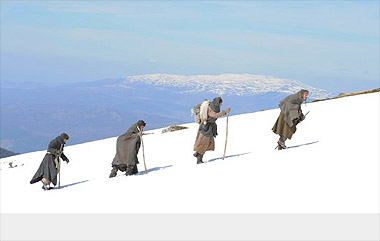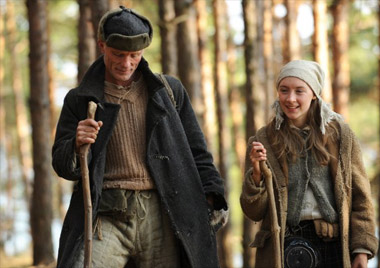
| HOME |
| NERVE |
| REVIEWS |
| ARCHIVE |
| EVENTS |
| LINKS |
| ABOUT US |
| CONTRIBUTORS |
| BACK ISSUES |
| CONTACT US |
 The Way Back
(12A)
The Way Back
(12A)
Directed by Peter Weir
Written by Keith R. Clarke (screenplay), Slavomir Rawicz (novel) and Peter
Weir (screenplay)
Reviewed by Craig Kell 11/1/2011
Seven years since directing the Oscar winning adventure Master and Commander: The Far Side of the World, Peter Weir makes his long awaited comeback to film-making with another adventure film The Way Back, that again proves to be blazing and epic as you could expect from a man like Weir. His films have not always endeared themselves to me, though Witness (1985) was an enjoyable experience. However his newest film stretches the production to an all-time high with this fascinating story adapted from The Long Walk.
Based on a true story, we are taken to the cold environment of Siberia in 1940 where Polish rebel Janusz (Jim Sturgess) is imprisoned for bad-mouthing Russian leader Joseph Stalin. He is sent to one of the toughest settlements in the world in Siberia, where he tries to survive amongst other men of different nationalities who have also been punished. However he seeks to escape from the place to be reunited with his wife and ends up hatching a plan with other men including American veteran Mr Smith (Ed Harris) and notorious murderer Valka (Colin Farrell).
Altogether seven men manage to escape the prison and soon they face the difficult task of trekking from Siberia, on a four thousand mile journey across many mountains and deserts to reach India. Along the way they are joined by a young woman named Irena (Saoirse Ronan) whose family are Communists, but she soon settles in with the group and becomes friendly with Mr Smith. However it is the forces of nature which threaten to affect the quest as the group encounter tough conditions, but they continue on leading to the film's satisfying conclusion.
 From
the film's opening shot, we are made aware of the fate of those involved
in the story, but the plot allows us to be drawn to a perilous and extraordinary
journey that these people went on in order to survive. We know that some
of the escapees won't make it, but it becomes a question of when and how
they'll fall. The variously aged cast does a solid job which allows us
to follow their predicament and make us realize what troubles they had
to go through. Jim Sturgess continues his prominence as an effective actor
playing the troubled leader of the group. Veteran actor Ed Harris adds
warmth as the reluctant prisoner who has been through tough times before
his involvement in prison and forms a nice partnership with rising actress
Saiorse Ronan who continues to develop her CV in film with another strong
role. Probably the most surprising positive from the cast is Colin Farrell,
who adds bark and no-nonsense to his character with a flourishing Russian
accent in a performance that is miles better than his recent cockney gangster
role in London Boulevard. Also like
most Weir films, this particular one is breathtaking as a visual masterpiece
with the gorgeous cinematography focusing on Siberia, Mongolia and India.
It is all beautifully shot with the setting whether it be in the woods,
the mountains or the desert, reminding us of classic epics like Lawrence
of Arabia.
From
the film's opening shot, we are made aware of the fate of those involved
in the story, but the plot allows us to be drawn to a perilous and extraordinary
journey that these people went on in order to survive. We know that some
of the escapees won't make it, but it becomes a question of when and how
they'll fall. The variously aged cast does a solid job which allows us
to follow their predicament and make us realize what troubles they had
to go through. Jim Sturgess continues his prominence as an effective actor
playing the troubled leader of the group. Veteran actor Ed Harris adds
warmth as the reluctant prisoner who has been through tough times before
his involvement in prison and forms a nice partnership with rising actress
Saiorse Ronan who continues to develop her CV in film with another strong
role. Probably the most surprising positive from the cast is Colin Farrell,
who adds bark and no-nonsense to his character with a flourishing Russian
accent in a performance that is miles better than his recent cockney gangster
role in London Boulevard. Also like
most Weir films, this particular one is breathtaking as a visual masterpiece
with the gorgeous cinematography focusing on Siberia, Mongolia and India.
It is all beautifully shot with the setting whether it be in the woods,
the mountains or the desert, reminding us of classic epics like Lawrence
of Arabia.
In some ways, the sloppy aspect of the film mostly comes from the writing, with Sturgess, Harris and Ronan being the only actors whose characters are given a back story. There is a lack of detail for the lesser known characters, as the other men and the actors who play them aren't given as much focus as the more recognisable names (one example being British actor Mark Strong as a fellow prisoner who is only involved in the first quarter of the film but is sadly underused). The story factor isn't helped either by us knowing the fate of at least three of the survivors at the beginning which does end the film a little predictably but it still makes us appreciate of how far they came. In some ways it also reminds me of Edward Zwick's recent war drama Defiance (2008), by showing with how the characters try to survive in tough circumstances, but the true story factor proves crucial.
It would be nice to think this film does deserve award attention, though technical recognition might end up being its only reward, which would be a shame for Weir who worked hard to make such a big triumphant story get to the big screen. Nevertheless the political explaining ending really does reflect the real life journey of those men involved and what it did for their politics, for them especially it really must have been the great escape.